West Hartford’s Native American Mascot Debate Takes Center Stage at Community Forum

Audio By Carbonatix
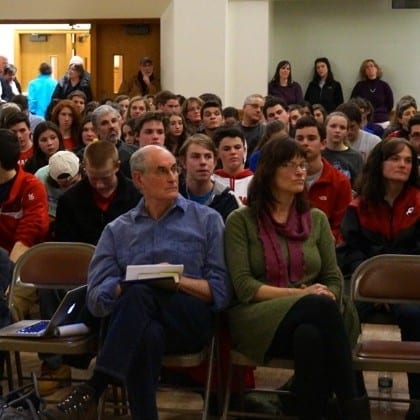
More than 250 people attended a community forum in West Hartford to speak about the high school names and Conard's mascot. Photo credit: Ronni Newton
There was a crowd of more than 250 Thursday night at the West Hartford Town Hall Auditorium, and many spoke before the Board of Education, voicing their opinions on changing or retaining the Conard Chieftain and Hall Warrior names and Conard’s Native American mascot.
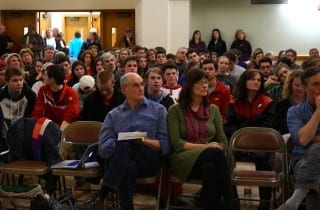
More than 250 people attended a community forum in West Hartford to speak about the high school names and Conard’s mascot. Photo credit: Ronni Newton
By Ronni Newton
The West Hartford Board of Education listened Thursday night, as 60 speakers voiced their opinions about the high schools’ Native American names and imagery at a standing-room-only forum at the Town Hall Auditorium.
Most of the speakers were passionate, but all were civil and respectful.
The majority of the audience, dozens of whom were wearing “Save the Chieftain” shirts, appeared to represent Conard and favor retaining the Chieftain name and mascot. However the speakers, each of whom as given 3 minutes at the podium, were about evenly split in their opinions about keeping or changing the Warrior name and the Chieftain name and mascot.
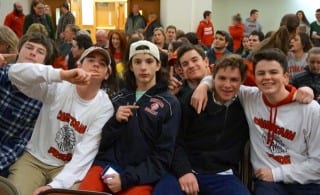
Many Conard students wore “Save the Chieftain” shirts to Thursday’s forum at Town Hall. Photo credit: Ronni Newton
Some who spoke in favor of keeping the Chieftain highlighted the tradition of the name, not only the fact that it has been in use for decades, but because it is a reflection of the history of the West Hartford area.
“The more I research this the more I realize that there is no one answer, no single answer that can satisfy all parties. There exists in West Hartford, in our state, a vital part of our history,” said Conard chemistry teacher and lacrosse coach Bill Condon, naming the many West Hartford streets that bear Native American names. “We can’t pretend these references are simply by chance; they were named this for a reason.” He said that the names represent and honor the cultural heritage and history of the town.
Others spoke of the what the names mean to the schools’ athletic teams, and said that there is nothing offensive, derogatory, or racist about them. “Team names are meant to represent power, brawn, toughness. If you don’t think the team names matter, you’re kidding yourself. It’s a big deal. This is an aburd extension of a crazy PC mentality,” said Tom Midney.

Conard senior Molly Bugos. Photo credit: Ronni Newton
Conard senior Molly Bugos said that for her, the decision was clear once she and other students spoke with Mohegan tribal leaders Kevin Red Eagle Brown and Lynn Malerba who said they “feel honored by Conard’s use of the Chieftain,” and Seneca Nation leader Lewis Lee who said that the Warrior and Chieftain names are a sign of pride. “I implore the Board of Education to make no changes. The names are indeed respectful and honorable,” Bugos said.
Conard graduate and current parent Roslyn Sheid, who said she is a descendent of the Candian Mohawks, said that use of the Chieftain and Warrior names are a sign of respect. “Our diversity should be celebrated, not sanitized. We honor those great Native American people past and present by doing so.”
Those who implored the Board to retire the mascot and school names said that the issue should not be about majority opinion.

Hall senior Jacob Cantor. Photo credit: Ronni Newton
“This isn’t a debate, it’s how we as a community recognize human dignity. This issue matters. There’s justice to be done, and right now is the time,” Hall senior Jacob Cantor said.
Conard history teacher Tracey Wilson said, “I can’t think of an example where the majority has supported the oppressed at the beginning.” Wilson said that even if the names and symbols are being used with respect in this community, there’s a broader message. “No matter what we do within our schools we cannot control it once we get outside our schools,” she said.
“The decision to retire the mascots and names may not be popular, but it necessary and it is time,” said Conard parent Judy Wyman Kelly.
“What matters is that we don’t reduce people to stereotypes. Justice and dignity must always trump tradition. Retiring the Chieftain mascot and name is what we are called to do in our time,” said Rabbi Debra Cantor.
We have heard much about the traits of courage, leadership and strength,” said Conard student Joe Duva. “Those are universal and should not be tied to one image … Changing the mascot does not change the pride people have felt in their school or the good intentions people had when Conard and Hall were founded … it simply means that we have earned much and learned when it is time to act responsibly and fairly.”
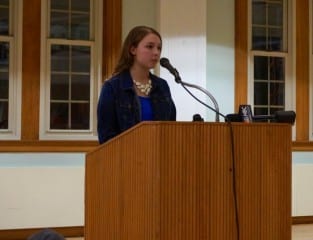
Conard student Rachel Yousman. Photo credit: Ronni Newton
Hall parent Stephen Pevar, an attorney and author of a book about Native Americans who also teaches about American Indian Law said he has “spoken about this issue with hundreds of Indians and I can tell you that they deeply resent you co-opting their image. You can deeply believe that you have the highest intentions but what you are doing is degrading and dehumanizing them.”
“The National Congress of American Indians has called for retirement off all mascots. Conard is not an exception … It is a matter of human rights,” said Conard student Rachel Yousman.
Conard parent Brian Lee said while there may be intolerance in the community, there are better ways to address it. “I don’t think that simply changing a logo or mascot gets to the underlying nature of the problem. I think education is a more prudent way to address intolerance that may exist in the community … and what our future community thinks of Native American culture.”
Several Chieftain supporters asked that Board make the decision about each school separately. Conard teacher and coach Kerrie Massaro urged the Board to consider the majority opinion, and said that the majority of Conard students (80 percent) and staff (60 percent) polled in December are in favor of keeping the Chieftain. “The majority of West Hartford doesn’t want change. … Each school should be viewed independently and our administrators will guide us,” she said.
“Conard and Hall are separate in their views and I think it should be left up to the Conard students to make their decisions. We should empower the kids to make their decision,” said Conard parent Chip Simplicio.
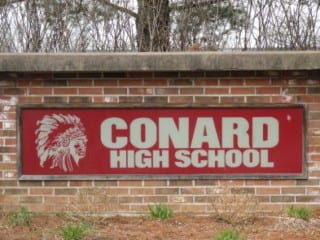
Current Conard exterior sign. Photo credit: Ronni Newton
Hall High School students have been known as “Warriors” since 1952, and when Conard High School opened in 1957 students there became known as the “Chieftains.” In 2011, Hall students voted to drop the Native American imagery but kept the Warrior name. At the same time, although nothing was officially changed, Conard began phasing out some of its Native American imagery as well, and many logos are now a block “C.”
Superintendent of Schools Tom Moore said that the cost to change the schools’ imagery would be more than $50,000. Replacing both the imagery and names was estimated at $97,000, not including the signage outside the buidings, some of which is in stone.
Now that the Board of Education has heard from the community, at the forum as well as through many letters and emails it has received, votes will be taken. Board Chairman Mark Overmyer-Velazquez said that three separate decisions will be made – on the school names, the Conard mascot/image, and the names of student organizations such as the Reservation and the Tribe.
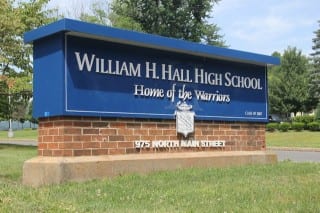
Current Hall exterior sign. Photo credit: Amy Melvin
“This has been going on for decades, and it’s time to deal with it. That’s why we’re elected officials,” said Overmyer-Velazquez.
“The board will discuss, deliberate, and work to craft new policies for the district. My intention is to establish broad guidelines that students and administrators can use, to craft new policies regarding Native Amercians,” Overmyer-Velazquez said.
Like what you see here? Click here to subscribe to We-Ha’s newsletter so you’ll always be in the know about what’s happening in West Hartford!



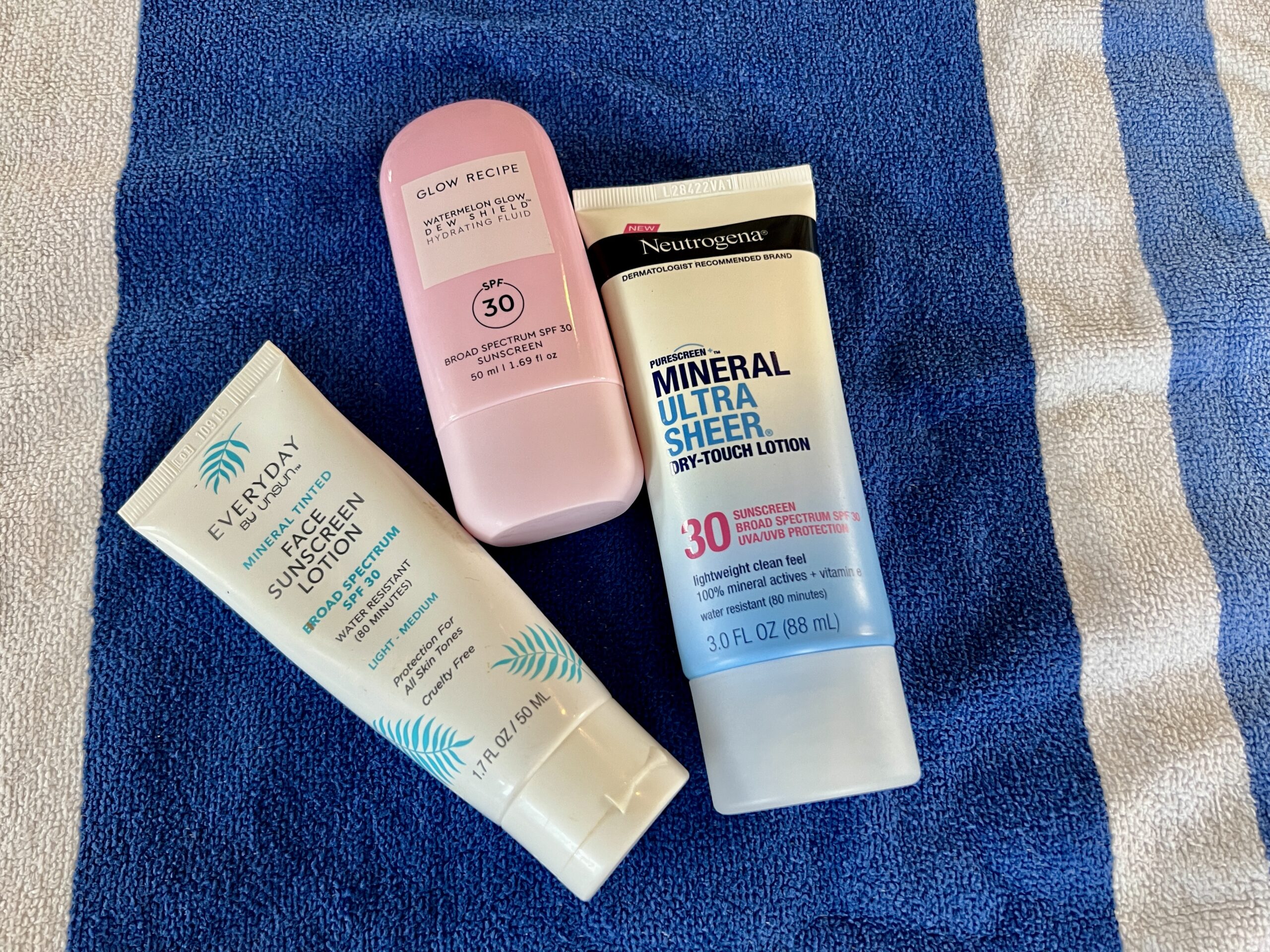
Glad people care AND that the conversation stayed civil.
[…] West Hartford Board of Education, after much deliberation and public input including a community forum that attracted 60 speakers and more than 250 attendees, voted in March 2015 to allow Conard and Hall to retain the Chieftain and Warrior names, with […]
[…] to honor those Native Americans by honoring them with an appropriate logo,” referring to a discussion that took place in February 2015, when more than 250 people attended a forum to express their strong and varied opinions regarding […]